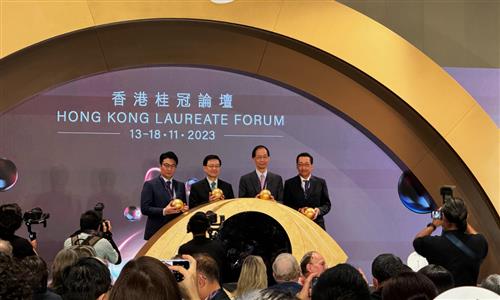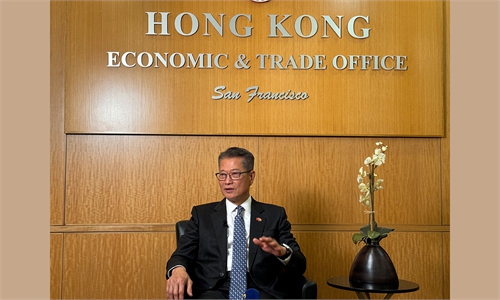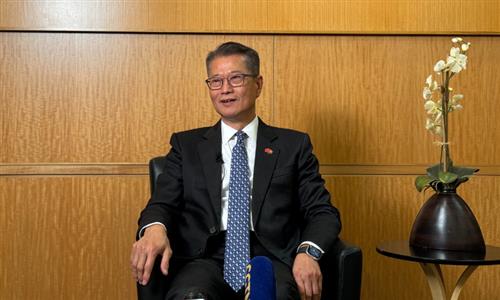Hong Kong Science Park demonstrates city's burgeoning power in innovation & technology
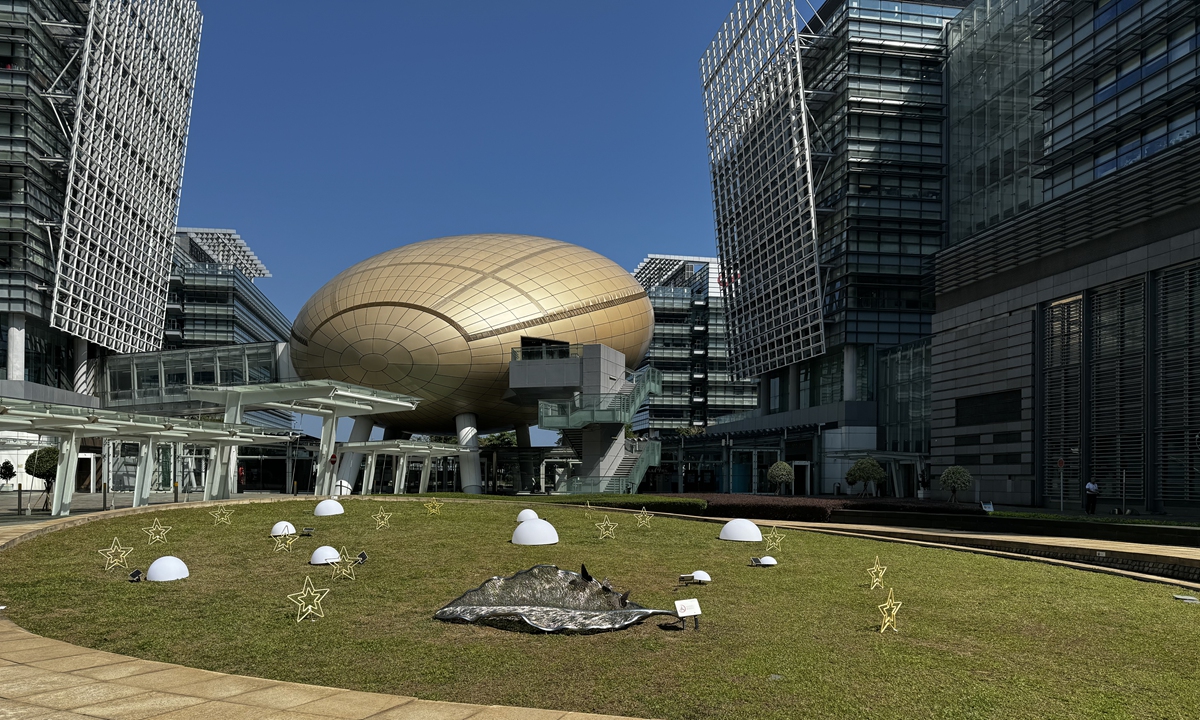
Hong Kong Science Park Photo: Liu Caiyu/GT
Hong Kong, a rising star in innovation and technology, is witnessing the creation of a surge of world-leading projects at the Hong Kong Science Park. As the sun rises in the morning, researchers and scientists flock to the park, eager to contribute to the city's transformation from a financial center to a global hub of innovation and technology (I&T).
The park currently houses 28 research centers, with a focus on healthcare, artificial intelligence, and robotics. This is a part of the InnoHK initiative, a significant endeavor by the Hong Kong Special Administrative Region (HKSAR) government to propel the city to the forefront of innovation.
During the Hong Kong Laureate Forum which gathered scientists worldwide to boost the innovation vibe of the city, Global Times reporters had the opportunity to speak with researchers and scientists who are now key to the InnoHK platform and represent the future of Hong Kong's push to develop itself into a prominent global hub for innovation and technology.
Pioneering projects
One of the pioneering projects taking place at the Hong Kong Science Park is the development of innovative drugs at the Center for Chinese Herbal Medicine Drug Development Limited.
Researchers at this center are dedicated to expanding the reach of Chinese herbal medicine beyond national borders by transforming traditional wisdom into pharmaceutical products. By extracting and optimizing the essence of traditional formulas into tablets, patients can experience the same, if not stronger, effects with just one to two tablets, Global Times reporters were told while visiting the center.
Lin Chengyuan, the assistant director of the Center, emphasized that the center focuses on enhancing traditional formulas by utilizing advanced analysis methods to identify their primary components. This information is then combined with an artificial intelligence platform to optimize medicines. Once the optimization process is complete, researchers will seek approval to enter the international market by registering with both the National Medical Products Administration (NMPA) in China and the US Food and Drug Administration (FDA), after conducting evidence-based preclinical and clinical research.
In a groundbreaking achievement, the Center received FDA approval this April to commence clinical studies on a botanical drug for chronic constipation in the US population. This marked the first instance of an optimized herbal medicine from Hong Kong receiving FDA approval for clinical trials.
Lin disclosed that the researchers are currently working on two additional investigational new drug applications of the FDA and NMPA. These applications pertain to Chinese herbal medicine for ulcerative colitis remission and constipation predominant irritable bowel syndrome, respectively.
Another notable project at the Hong Kong Science Park is the Hong Kong Centre for Cerebro-cardiovascular Health Engineering (COCHE). Within COCHE, several sub-companies are working on developing cutting-edge systems for early diagnosis and intervention using cerebro-cardiovascular health engineering.
One of the highlights is a home-based organ health monitor that can be used in both outpatient and home settings. Russell Chan, one of the team members told the Global Times that this monitor, based on electrical impedance tomography, helps patients detect the early stages of chronic diseases affecting the liver, lung, brain, and kidneys.
Chan said the monitor is expected to enter clinical trials and enter the market in coming years, with a broad market prospect ahead as more than 130 million people are suffering from chronic diseases.
Also in Hong Kong Center for Construction Robotics (HKCRC), a scientific research and entrepreneurship platform, the Global Times reporters have a close look over how researchers around the globe is committed to introducing cutting-edge technologies like robotics, automation, and artificial intelligence to the construction sector. From colored 3D scanners, wall polishing robot to an unmanned tower crane, the HKCRC offers a wide range of choices for their partnerships.
Within a year or so, the general public would see fruitful scientific results coming out of the world-leading 28 centers, Timothy Tong Wai-cheung, chairman of the Hong Kong Laureate Forum, told the Global Times. These projects will fulfill Hong Kong's endeavor to secure the position as an international I&T hub around the globe, he said.
"We also have Key Performance Indicators (KPIs) that provided to the SAR government to achieve. Hopefully we could get another five-year funding from the SAR government so that our researchers are able to have more researches done," one of the researchers at the labs told the Global Times.
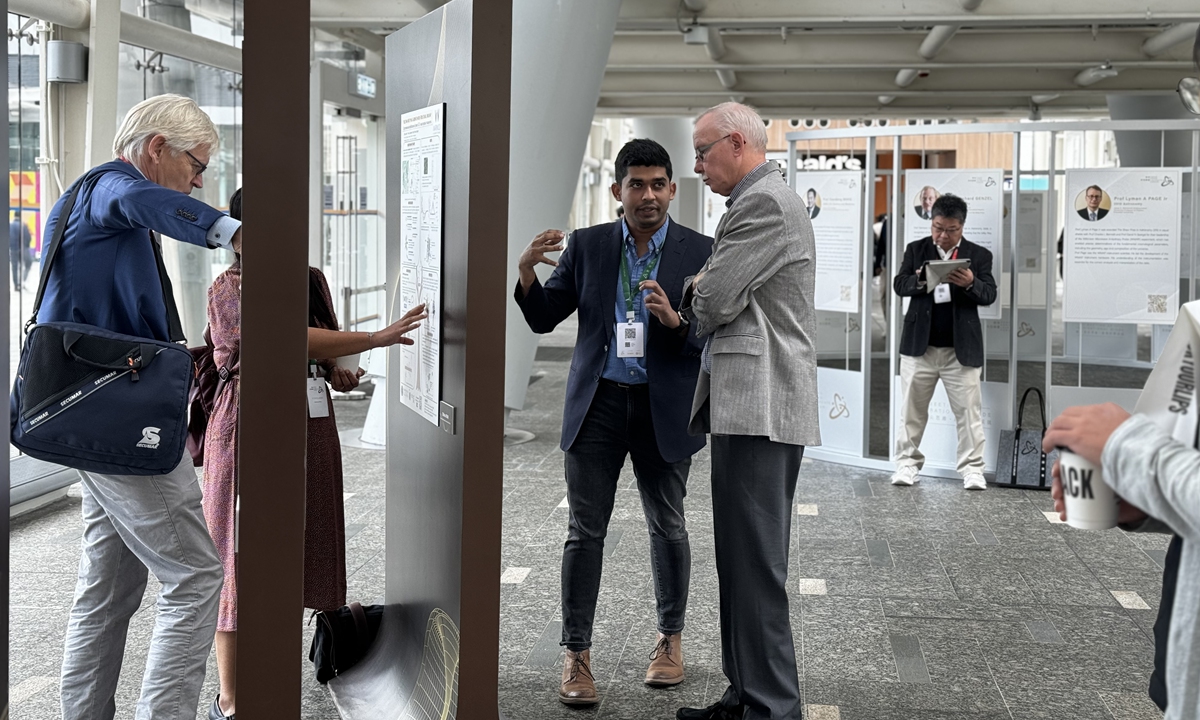
Scientists share insights during the Hong Kong Laureate Forum on November 14, 2023. Photo: Liu Caiyu/GT
All ingredients in place
With the world-leading scientific programs, funding from SAR governments, talents and international partners, Hong Kong already possesses all the ingredients to become an international I&T center, Tong believed.
The talents of these centers play a crucial role. Just like the other 28 labs, the confidence of Lin's company and COCHE is greatly enhanced by the diverse talents they have acquired from both domestic and international sources.
Lin's team, supported by Hong Kong Baptist University, has also successfully attracted resources from prestigious institutions such as the mainland, University of Macao, and the University of Chicago. Similarly, COCHE collaborates with renowned institutions like the University of Oxford, the Karolinska Institute, and City University of Hong Kong.
The InnoHK platform has successfully fostered partnerships with over 30 prestigious universities and research institutes, attracting approximately 2,000 researchers from both local and international backgrounds.
Wang Xiaodong, a renowned biochemist and the director of the National Institute for Biological Sciences in Beijing who also attended the Hong Kong Laureate Forum, told the Global Times that science boils down to cooperation and communication. Hong Kong where is compatible in both working environment, attracting international talent as well as abundant resources in educational sectors make it an ideal city to develop I&T sector.
On top of that, Dennis Lo, scientific Director of Centre For Novostics, one of the 28 labs in Hong Kong Science Park, which focuses on the development of cutting edge diagnostics based on cell-free nucleic acids in blood and other bodily fluids, joked to the audience of Hong Kong Laureate Forum that this was the first time in his career life that he has an office with windows. Windows helps him generating innovative ideas.
"We can say that Hong Kong is the ideal platform for global talents and enterprises to succeed," Sunny Chai, the Chairman of Hong Kong Science Park addressed one plenary discussion at the Hong Kong Laureate Forum.
Chai noted that the SAR government has invested nearly HK$ 200 billion in sector of I&T since 2015, also the latest policy address has outlined new measures under seven directions to attract world leading enterprises and talents to the city and support leading I&T projects.
In addition, Chai emphasizes that the development of the Greater Bay Area (GBA) has opened up a distinct opportunity for the city's value creation. Hong Kong, with its esteemed status as a leading research center for I&T and an international financial hub, can act as a dual platform. It can facilitate the entry of multinational I&T companies into the GBA market and support mainland I&T companies in expanding their presence overseas, Chai noted.

